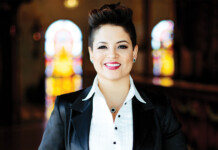Each week throughout the month of October, we profiled two people from the Equality Forum LGBT History Month icons list who have made a positive impact in their chosen professions. To see Equality Forum’s 2015 icons list, visit lgbthistorymonth.com.
 Richard Blanco
Richard Blanco
(born February 15, 1968)
Richard Blanco was born to Cuban immigrants who entered the United States via Spain, where he was born. He and his family settled in Miami, where he graduated from Christopher Columbus High School. He graduated with a degree in civil engineering from Florida International University and pursued a master’s in creative writing from the same school.
He released his first book, City of a Hundred Fires, in 1998. Starting in 1999, Blanco traveled around the world, trading Miami for Boston as a home base. He lived in Guatemala and Brazil, and also was a guest lecturer at Georgetown University and American University. As a poet, his work has been published most often by University of Pittsburgh Press. As part of an anthology series, his work has been published in The Nation, New England Review, Americas Review, and many other journals.
Many of his works describe what it’s like to grow up being Cuban in Miami in the 1970s and 1980s, and also what it’s like to grow up as a gay man in a Hispanic world. He was selected to read a poem at Barack Obama’s second inauguration ceremony in 2013, becoming the first Latino, the first gay man, and the youngest poet ever to do so. After hearing the news, he was said to have remarked to his mother, “I think we’re finally American.” He wrote three different poems, and administration officials chose the one he would read aloud. That poem was called “One Today.” Critics deemed the poem “Overall…successful, art meant to orient, to reconfirm collective identity in a time of recent tragedy. It’s an optimistic, careful piece meant to encourage, a balm.” He published all three poems in November 2013.
After reading his poem at the inauguration, he was asked to write and recite poems at a number of other events, such as the Boston Strong Benefit Concert, the Freedom to Marry organization, and the Tech Awards in Silicon Valley, California. He also wrote a memoir, The Prince of Los Cocuyos: A Miami Childhood (2014), which won the 2015 Lambda Literary Award for Best Gay Memoir. Blanco and his partner divide their time between two houses, one in Boston, Massachusetts and one in Bethel, Maine.
 Sahaykwisa
Sahaykwisa
(ca. 1850 – 1895)
Sahaykwisa was one of the earliest recorded examples of what we would now call a transgender man in Native American life. While outwardly exhibiting female sexual characteristics such as large breasts, Sahaykwisa went as far as to participate in warrior initiation rites as if he were born male. He was very rich, and documents show that he earned his wealth partly by prostituting himself to white men. A very genuine and engaging person, Sahaykwisa had no problem finding companions of his own — he married multiple women.
He worked as a healer and also dabbled in witchcraft, which saw his Mojave community unsuccessfully try to root him out as a witch by the time he turned 30. He also took the time to plant crops on his land and did all the farmwork that was expected of a man. His first wife was very proud of the role Sahaykwisa took as provider for their family, and even though other members of their tribe were homophobic and transphobic, she stayed married to him for a number of years — first leaving him for another man, and then returning to him. In the story, it is revealed that the cisgender man had not satisfied her sexually the way Sahaykwisa could.
Even though there was a life path for Sahaykwisa in the Mojave nation, it was still very homophobic and transphobic, and Sahaykwisa would marry twice; his wives left after not being able to take the verbal abuse from village elders anymore. At this time, something in Sahaykwisa snapped and he painted his face like a warrior’s and went away to another camp. This camp was far less approving of him, but he did find another wife, which he lured away from another man. The man, afraid of losing face by fighting with “a woman,” decided not to intervene. This marriage was short-lived.
A man from another camp raped Sahaykwisa and it had a profound negative effect on his life, leading him to become an alcoholic. He would never court women again, and would actively engage in sexual contact with a number of men while drunk. He fell in love with a village elder, and when he rebuffed him, Sahaykwisa used his magic powers to place a spell on him. When he died unexpectedly, people whispered that it was his spell that did him in. He bragged drunkenly about this spell to two men, who drowned him in the Colorado River. Sahaykwisa’s murderers were never caught because the Mojave people believed it was his punishment for dabbling in witchcraft.















